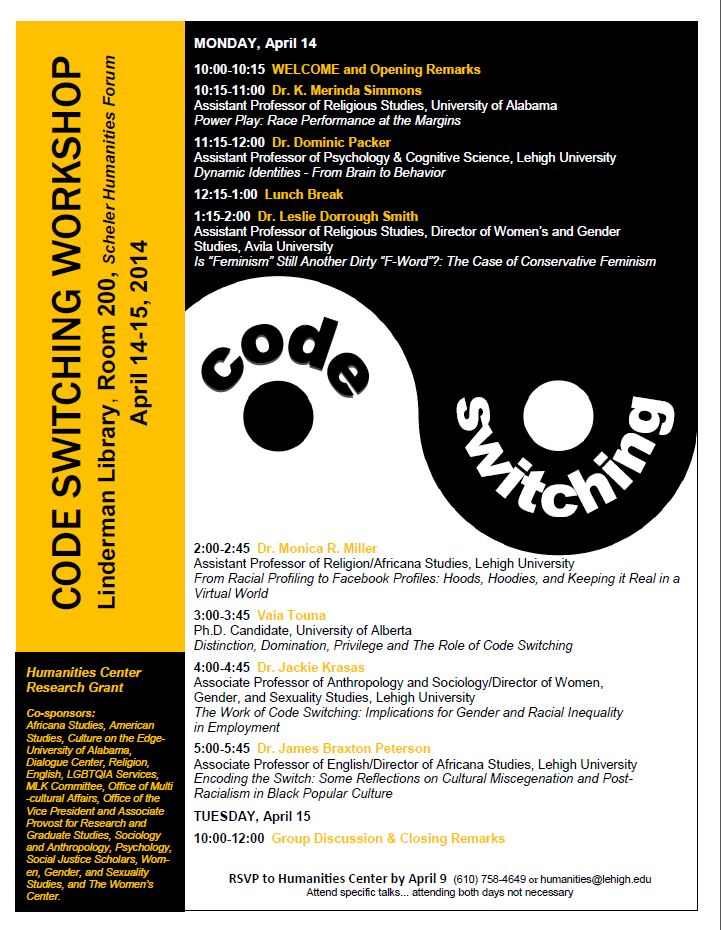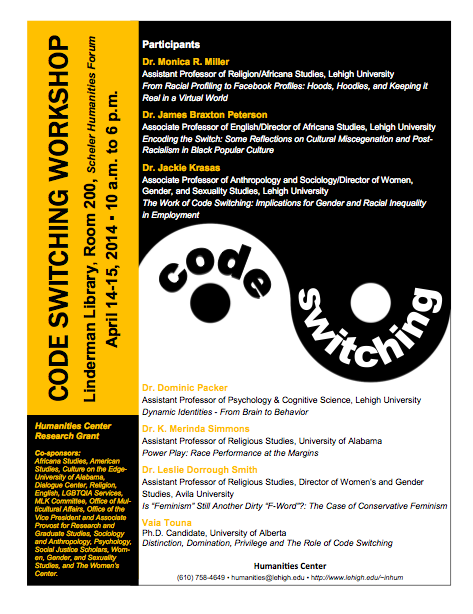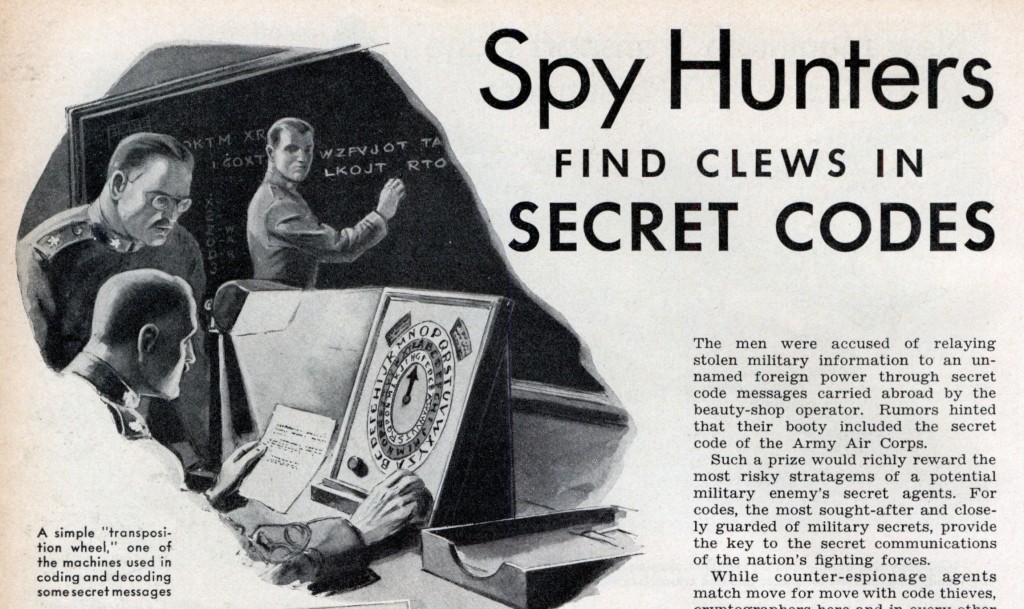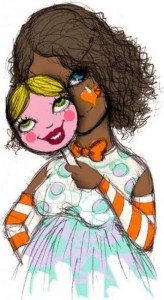 National Public Radio’s “Code Switch” team has posted some pretty interesting stories, I think, but it nonetheless seems to perpetuate a notion of code switching as a very specific sort of move, the possession of just a select few strategic actors, rather than seeing it basically as synonymous with being any social actor. Continue reading “Not All of Us?”
National Public Radio’s “Code Switch” team has posted some pretty interesting stories, I think, but it nonetheless seems to perpetuate a notion of code switching as a very specific sort of move, the possession of just a select few strategic actors, rather than seeing it basically as synonymous with being any social actor. Continue reading “Not All of Us?”
Up, Up, and Away
 Is every code switch spoken?
Is every code switch spoken?
You’ll learn more at Lehigh University when
the Edge comes to town in a few weeks.
Code Switching 101
 But is this code switching?
But is this code switching?
You’ll learn more at Lehigh University when
the Edge comes to town in a few weeks.
#edgeswitch
 The latest Code Switching Workshop flyer now has the workshop program listed on it, so be sure to take a look! Also keep an eye out for live updates on our twitter feed @idendefying
The latest Code Switching Workshop flyer now has the workshop program listed on it, so be sure to take a look! Also keep an eye out for live updates on our twitter feed @idendefying
(Click on the image to see a larger version.)
Code Switching at Lehigh University
 On April 14-15, 2014, Lehigh University will be hosting a Code Switching Workshop inspired by, and comprised of, Culture on the Edge‘s Monica Miller, Merinda Simmons, Leslie Dorrough Smith, and Vaia Touna. They will be joined by two other Lehigh faculty members: James Peterson, Associate Professor of English and Director of Africana Studies, and Jackie Krasas, Associate Professor of Anthropology and Sociology and Director of Women, Gender and Sexuality Studies.
On April 14-15, 2014, Lehigh University will be hosting a Code Switching Workshop inspired by, and comprised of, Culture on the Edge‘s Monica Miller, Merinda Simmons, Leslie Dorrough Smith, and Vaia Touna. They will be joined by two other Lehigh faculty members: James Peterson, Associate Professor of English and Director of Africana Studies, and Jackie Krasas, Associate Professor of Anthropology and Sociology and Director of Women, Gender and Sexuality Studies.
The topic of code switching here at the Edge began last summer (2013) and then developed into a couple of blog posts (here and here).
Stay tuned to learn more
about the upcoming workshop…
Who Are You? I’m A Nervous Flyer

“Who Are You?” asks members of Culture on the Edge to reflect on one of their own many identities (whether national, gendered, racial, familial, etc.), theorizing at the same time the self-identification that they each chose to discuss.
Preparing for Departure: I Knew I Knew You!
I’m am extremely nervous flyer. Walking onto a plane – and preparing for the anxiety of the flight – I enact rituals of certainty. Such practices don’t begin on the plane. They commence in the airport once I’ve arrived at my gate. I might call them rituals of identification for in turning myself into data as often as I do when I’m enacting such practices, I am clear that such things rely on the strategies I enact in reading other people (for my own purposes) – i.e., ones that often involve strategies such as authenticity and strategic essentialism as I scan the crowd trying to take stock of the “who” I might be in company with on the plane. In being a nervous flyer and by reflexively examining my practices, I seemingly learn more about this thing we call identity – how I catalogue others for my own social interests (i.e., protection and safety) and thus, how others read me back. Continue reading “Who Are You? I’m A Nervous Flyer”
Behind the Scenes: A Conversation on “Code Switching”

Back in late June 2013, three members of Culture on the Edge had a conversation on Facebook about the category “code switching” (nicely exemplified in the above Key & Peele skit, featuring Luther, President Obama’s “anger translator” [watch it below]), a conversation that later led to two blog posts on our site, referencing this conversation (here and here) and, ultimately, to Monica Miller conceiving of a workshop at Lehigh University, funded by a Collaborative Research Grant from its The Humanities Center — an opportunity that will involve Lehigh faculty members, James Peterson, Associate Professor of English and Director of Africana Studies, Jackie Krasas, Associate Professor of Anthropology and Sociology and Director of Women, Gender and Sexuality Studies, along with three of her Edge colleagues: Merinda Simmons, Leslie Dorrough Smith, and Vaia Touna — all of whom work on identity and language, but in very different domains and historical periods.
We hope that the following conversation — spruced up a bit for public consumption — helps to set the stage for some of the early thinking that may be in the background of the workshop, which takes place in April 2014 (more news on that coming soon).
6/29, 4:45pm
Russell McCutcheon
Ok, I have a query: it strikes me that, despite how many use it, “code switching” is a profoundly imperial category, one that perpetuates certain notions of race (when it is applied to studying some instances of African American English), while seemingly only describing them, yet no one realizes it.
What do you think? Continue reading “Behind the Scenes: A Conversation on “Code Switching””
“No, Really, Where Are You From?”
 “Race” is such a problematic, complex term, no? We use it as if it refers to some stable thing (like when we complete a government form) but as soon as we look at its use more closely we realize it is a vague designation for a variety that spans a limitless continuum with no clear internal boundaries. “Race” — as in “What race are you?” — is thus our way of creating the impression of managing what may in fact be unbridled human difference, as if it has nicely defined internal compartments.
“Race” is such a problematic, complex term, no? We use it as if it refers to some stable thing (like when we complete a government form) but as soon as we look at its use more closely we realize it is a vague designation for a variety that spans a limitless continuum with no clear internal boundaries. “Race” — as in “What race are you?” — is thus our way of creating the impression of managing what may in fact be unbridled human difference, as if it has nicely defined internal compartments.
Case in point: the fellow above — Alex Sugiura — was featured in a story recently (and another a little before that), on the increasingly mixed race nature of American culture. He’s from Brooklyn but, of course, that’s not where he’s really from, right? Continue reading ““No, Really, Where Are You From?””
“They’ve Given You a Number and Taken Away Your Name”
 A while back a couple Edge posts appeared on the topic of “code switching” (Merinda’s post is here and Monica’s is here). Listening to NPR this morning I heard a story on the NSA’s use of codewords for its various clandestine projects — how it follows longstanding conventions in writing them as one word and in all caps, like SHARKFINN, KEYSTONE, or DISHFIRE — and that made me think again on the topic of code switching. Continue reading ““They’ve Given You a Number and Taken Away Your Name””
A while back a couple Edge posts appeared on the topic of “code switching” (Merinda’s post is here and Monica’s is here). Listening to NPR this morning I heard a story on the NSA’s use of codewords for its various clandestine projects — how it follows longstanding conventions in writing them as one word and in all caps, like SHARKFINN, KEYSTONE, or DISHFIRE — and that made me think again on the topic of code switching. Continue reading ““They’ve Given You a Number and Taken Away Your Name””
Whose Switch is a Switch?
 Code switching is often used to reference the actions (usually linguistic variations) of a particular person/group that is assumed to break from their own “natural” practices to perform codes “not their own” for the purposes of fitting in, acquiring capital, and accessing spaces thought to perceive the “native” practices of the switcher as illegitimate or illegible. This switching, or shifting as some call it, is often painted with a stroke of fluidity and described to take know-how, precision, performance and rehearsal. While the durability or recapitulations of code switching may come to be seen as natural over time, where it’s no longer recognized or described as a switch, it’s often thought to be something that is and can be [consciously] turned off and on like a light switch by the social actor. Continue reading “Whose Switch is a Switch?”
Code switching is often used to reference the actions (usually linguistic variations) of a particular person/group that is assumed to break from their own “natural” practices to perform codes “not their own” for the purposes of fitting in, acquiring capital, and accessing spaces thought to perceive the “native” practices of the switcher as illegitimate or illegible. This switching, or shifting as some call it, is often painted with a stroke of fluidity and described to take know-how, precision, performance and rehearsal. While the durability or recapitulations of code switching may come to be seen as natural over time, where it’s no longer recognized or described as a switch, it’s often thought to be something that is and can be [consciously] turned off and on like a light switch by the social actor. Continue reading “Whose Switch is a Switch?”
